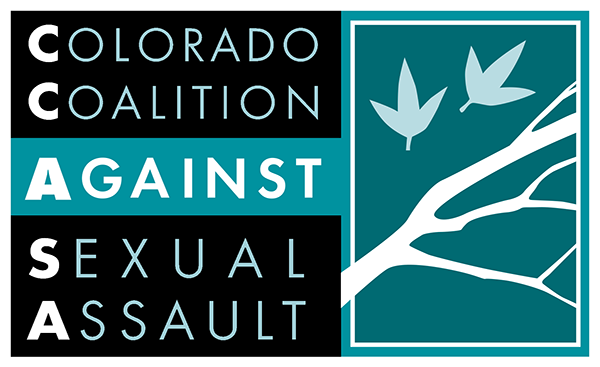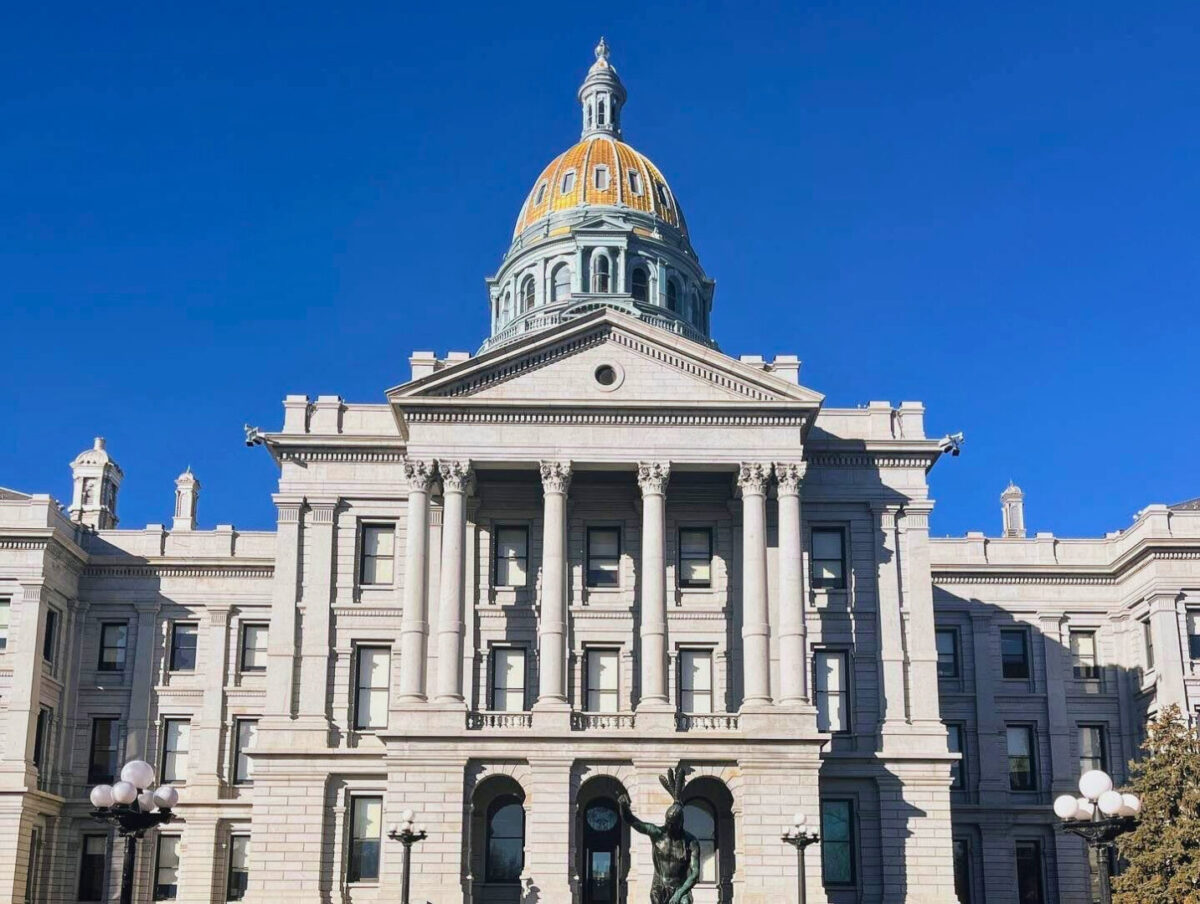2025 Legislative Session: Final Report
The Colorado Coalition Against Sexual Assault celebrates a successful 2025 legislative session to improve the response to and prevention of sexual violence in Colorado. Despite great uncertainty and funding threats, this session brought hard-won victories, tough conversations, and meaningful progress. Although there is still much work ahead, we are grateful for what was accomplished in just 120 days:
- Improved fairness in the courts and removal of barriers for survivors accessing civil and juvenile court proceedings;
- Accountability for the harmful use of artificial intelligence (AI) to create sexual deepfakes, including child sexual exploitation material (CSEM), through civil and criminal penalties;
- Systemic reform for testing sexual assault evidence kits through the creation of a new board to review and propose additional reforms to improve the response to sexual assault by the medical, law enforcement, criminal-legal, and judicial systems; and
- More safe spaces for survivors to seek stable housing, services, support, and accountability.
Key Bills:
House Bill 25-1185: Child Conceived from Sex Assault Court Proceedings (Representatives Froelich and Willford, Senator Weissman) – Passed 5/1/25, Effective 8/6/25
Prior to this law, survivors of rape-related pregnancies had not been able to successfully petition the courts to terminate their assailant’s parental rights, despite having the right to do so for over 10 years. This law requires the State Court Administrator to develop a form to create a clear path for survivors to access this established process. Additionally, it eliminates the requirement for mandatory counseling, court fees, and child support for survivors who choose to relinquish their parental rights for a child conceived from sexual assault.
House Bill 25-1138:Protect Victims in Civil Sex Misconduct Suits (Representatives Lukens and Pugliese, Senators Kirkmeyer and Daugherty) – Passed 3/13/25, Effective 7/1/25
This law expands Colorado’s civil rape shield law to eliminate harmful biases and stereotypes that survivors often face in the civil legal process. Mirroring changes to the criminal rape shield law passed in HB24-1072, HB25-1138 restricts evidence related to a survivor’s clothing, hair, appearance, or sexual history with the defendant as proof of consent, credibility, or extent of harm in civil sexual assault cases.
House Bill 25-1168: Housing Protections for Victim-Survivors (Representatives Lindsay and Espenoza, Senator Weissman) – Passed 5/22/25, Fully Effective 8/6/25
This law improves housing protections for survivors of stalking, sexual violence, and domestic violence. Although survivors of sexual violence often experience housing instability, they have historically been excluded from key protections granted to survivors of domestic violence and domestic abuse. Recognizing this disparity, the law grants existing eviction protections to survivors of sexual violence and stalking. Additionally, it expands the types of documentation allowable for eviction and lease-break protections to include a letter from a third party, such as an advocate or therapist, or a self-attestation document. The law also requires landlords to offer survivors a repayment plan before evicting them for getting behind on rent, and allows survivors to take reasonable safety measures—including changing locks or installing cameras—without landlord interference or retaliation.
Senate Bill 25-288: Intimate Digital Depictions Criminal & Civil Actions (Senator Rodriguez, Representatives Titone and Soper) – Passed 6/2/25, Effective 8/6/25
This law addresses the rising misuse of artificial intelligence (AI) to create sexual deepfakes of adults, teens, and children. Building upon the groundwork laid in SB24-011, this law creates both civil and criminal accountability for a person who discloses or threatens to disclose a sexual image that has been created, altered, or produced by generative AI, image editing software, or computer-generated means. It also updates Colorado’s child sexual exploitation material (CSEM, or child pornography) statute (CRS 18-6-403) to include CSEM that has been digitally created, altered, or produced.
Senate Bill 25-304: Measures to Address Sexual Assault Kit Backlog (Senator Weissman, Representatives Willford and Froelich) – Passed and Effective 6/3/25
Created in response to the sexual assault evidence kit backlog, this law strengthens communication with survivors and the public around kit testing timelines; encourages quicker kit processing; and improves Colorado’s systematic response to sexual assault by creating a permanent sexual assault forensic medical evidence review board within the Attorney General’s Office to identify issues and make recommendations regarding survivors’ experiences across systems.
OTHER NOTABLE BILLS
- House Bill 25-1188: Mandatory Reporter Task Force Recommendations (Representative Froelich, Senators Michaelson, Jenet, and Amabile) – Passed and Effective 5/31/25. This law makes key updates to Colorado’s mandatory reporting requirements for child abuse, including the removal of community-based victim advocates as mandatory reporters to promote survivors’ access to safety and supportive services. The law also clarifies that the duty to report is within 24 hours, applies only during a reporter’s professional capacity, cannot be delegated, and cannot be based on race, ethnicity, socioeconomic status, or disability.
- House Bill 25-1031: Law Enforcement Whistleblower Protection (Representatives Bacon and Clifford, Senators Roberts and Pelton) – Passed and Effective 6/3/25. This law creates new whistleblower protections for law enforcement officers to enable them to report misconduct that they witness or are subject to, including sexual violence and harassment, without fear of retaliation.
- House Bill 25-1098: Automated Protection Order Victim Notification System (Representatives Stewart and Soper, Senators Michaelson, Jenet, and Gonzales) – Passed 6/2/25, Fully Effective 8/6/25. This law creates an automated protection order notification system to ensure survivors and their families have timely access to information about their protection orders, including when it is served, when it is set to expire, and when the restrained party has applied to purchase a firearm.
- House Bill 25-1275: Forensic Science Integrity (Representatives Soper and Zokaie, Senators Weissman and Frizell) – Passed and Effective 6/2/25. Created in response to the Colorado Bureau of Investigations’ forensic scientist misconduct scandal unveiled in 2023, this law requires crime lab staff to report misconduct within seven days. The law also requires crime lab directors to investigate all reports of misconduct, develop a final report, and communicate with district attorneys who have jurisdiction over any impacted cases. Finally, it creates a requirement to notify victims and defendants and a right to counsel for defendants whose cases are impacted.
- House Bill 25-1132: Military Family Behavioral Health Grant Program (Representatives Camacho and Stewart, Senators Hinrichsen and Bridges) – Passed 5/1/25, Effective 8/6/25. This law creates a grant program to support nonprofits that provide mental health services to active-duty military
members, veterans, and their families by utilizing $1.5M in Prop KK funding. - House Bill 25-1304: Extension of Restitution Deadlines (Representatives Froelich and Soper, Senators Snyder and Bright) – Passed and Effective 5/30/25. This law extends restitution deadlines by allowing prosecuting attorneys to submit needed information to judges up to 63 days post-conviction and grants judges an additional 63 days to order restitution after receiving said information.
- House Bill 25-1081: Reporting Statistics on Restitution (Representatives Martinez and Soper, Senator Weissman) – Passed 3/26/25, Effective 8/6/25. This law requires the State Court Administrator to report statistics regarding restitution payments made and owed over the past five years to the legislature starting in 2026.
- House Bill 25-1309: Protect Access to Gender-Affirming Health Care (Representatives Brown and Titone, Senators Cutter and Gonzales) – Passed and Effective 5/23/25. This law codifies access to gender-affirming health care and prohibits health insurance plans from denying or limiting medically necessary services.
- House Bill 25-1312: Legal Protections for Transgender Individuals (Representatives García and Stewart, Senators Winter and Kolker) – Passed and Effective 5/16/25. This law expands protections for transgender people across multiple key areas, including civil union and vital record documents, K-12 name and dress code standards, and the Colorado Anti-Discrimination Act.
- Senate Bill 25-001: Colorado Voting Rights Act (Senator Gonzales, Representatives Bacon and Joseph) – Passed 5/12/25, Effective 8/6/25. This law prohibits voter suppression and dilution of protected class members through harmful practices such as gerrymandering. It also prohibits additional voting requirements based on a person’s gender identity, gender expression, sexual orientation, or incarceration status.
- Senate Bill 25-008: Adjust Necessary Document Program (Senators Hinrichsen and Kipp, Representative Froelich) – Passed 5/19/25, Effective 8/6/25. This law increases access to critical ID documents under Colorado’s Necessary Documents Program by eliminating the need for a physical voucher.
- Senate Bill 25-155: Legislation Inside Advisory Council (Senators Gonzales and Ball, Representative Clifford) – Passed and Effective 5/20/25. This law creates the Legislation Inside Advisory Council, which will identify the needs of people who are incarcerated and make recommendations to the General Assembly.
- Senate Bill 25-183: Coverage for Pregnancy-Related Services (Senators Rodriguez and Daugherty, Representatives García and McCluskie) – Passed and Effective 4/24/25. This law statutorily implements Amendment 79 (passed by voters during the November 2024 general election), enshrining the right to abortion in the state constitution and removing the ban on using public funds to cover abortion-related care.
- Senate Bill 25-014: Protecting the Freedom to Marry (Senator Danielson, Representatives García and Titone) – Passed and Effective 4/7/25. This law statutorily implements Amendment J (passed by voters during the November 2024 general election), removing the unconstitutional ban on same-sex marriage and bringing Colorado into alignment with Obergefell v. Hodges.
- Senate Bill 25-130: Providing Emergency Medical Services (Senators Gonzales and Weissman, Representatives Froelich and Zokaie) – Passed and Effective 5/14/25. This law requires hospitals, emergency departments, and licensed healthcare facilities to provide emergency medical services, including abortion and miscarriage care, to all patients.
- Senate Bill 25-129: Legally Protected Health-Care Activity Protections (Senators Cutter and Winter, Representatives Joseph and McCormick) – Passed and Effective 5/24/25. This law provides legal protection to healthcare workers who provide abortion services to patients traveling from other states and allows pharmacies to use only the name of healthcare practices on medical abortion medications.
- Senate Bill 25-009: Recognition of Tribal Court Orders (Senators Roberts and Danielson, Representatives Weinberg and Joseph) – Passed and Effective 5/5/25. This law allows state courts to recognize arrest warrants and rescission orders issued by Tribal courts.
FAILED BILLS
- House Bill 25-1291: Transportation Network Company Consumer Protection
- House Bill 25-1073: Protections Against Child Rape
- House Bill 25-1194: Protections for Victims of Economic Abuse
- House Joint Resolution 25-1023: Require General Assembly TABOR Constitutionality Lawsuit
- Senate Bill 25-064: Safe2tell Handle with Care Notice
- Senate Bill 25-157: Deceptive Trade Practice Significant Impact Standard
- Senate Bill 25-201: Require Age Checks for Online Sexual Materials
- House Bill 25-1028: Modifications to Address Confidentiality Program
- House Bill 25-1150: Forfeiture of Public Employees’ Retirement Benefits by Sex Offenders
- Senate Continuing Resolution 25-002: Child Sexual Abuse Accountability Amendment
The Colorado Coalition Against Sexual Assault (CCASA) was founded in 1984 as a 501(c)3 nonprofit to be the collective voice of rape crisis advocates across the state of Colorado. Today, our membership includes over 100 sexual assault survivors, victim advocates, rape crisis centers, dual domestic violence and sexual assault programs, college and university campuses, medical professionals, law enforcement agencies, prosecutors, public health agencies, offender treatment programs, public officials, as well as other organizations and concerned individuals throughout Colorado. As a statewide coalition, CCASA supports our members, partners, and the broader community through technical assistance, training, information and referrals, educational materials, statewide systems change, and public policy education and advocacy. To learn more about our work to support survivors, please visit https://ccasa.org/public-policy/
This report is supported by Grant No. 15JOVW-24-GG-00919-MUMU awarded by the Office on Violence Against Women, Office of Justice Programs, U.S. Department of Justice. The opinions, findings, and conclusions expressed in this report are those of the author(s) and do not necessarily reflect the views of the U.S. Department of Justice. No federal funds were used for lobbying activities.

